Patrya Pratama’s path on the Indonesian education scene is one with many twists and turns. He started out as a volunteer teacher in the Teach for Indonesia (Mengajar) initiative in 2010, then got hired as a policy analyst to work with the government. Today, he manages a non-profit.
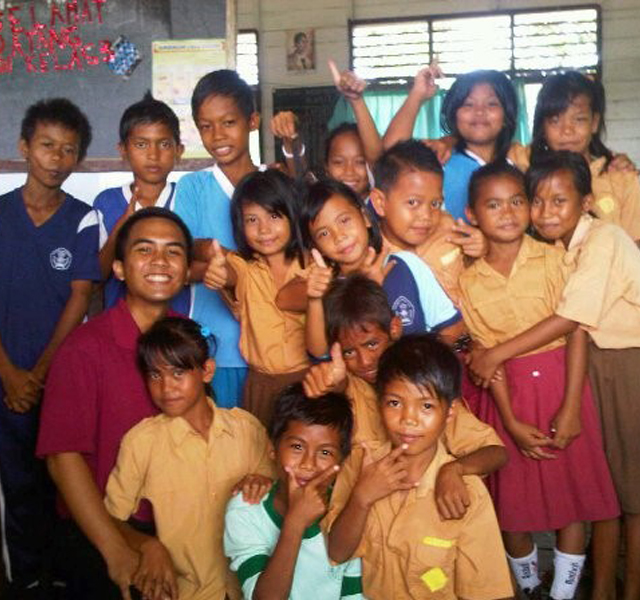
Patrya as the classroom teacher, Grade 3, during service as a “Young Teacher” volunteer for Indonesia Mengajar (Teach for Indonesia) programme.
Patrya, who had enrolled in the Master of Public Policy (MPP) programme at Lee Kuan Yew School of Policy (LKYSPP) in 2012, is the CEO of Inspirasi, an Indonesian non-profit working to improve leadership in schools. He holds a dual degree from both LKYSPP and the London School of Economics. In October 2019, he was awarded the ASEAN Youth Fellowship for being a promising young leader in the region.
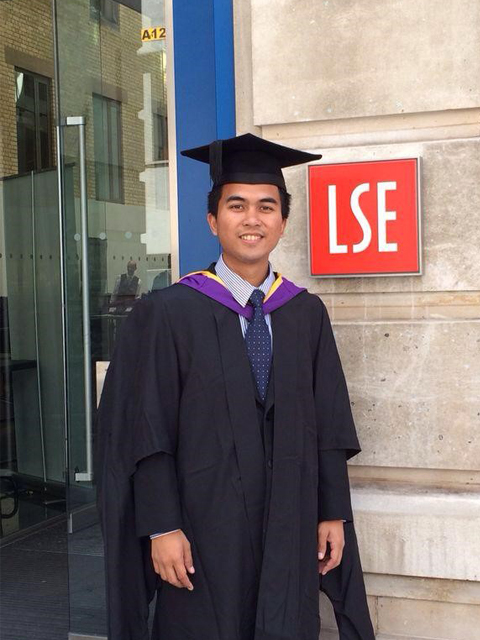
Dual Degree program with the LSE back in 2013
[ALUMNI-INFO TEXT="Patrya is candid when he says, “the initial idea of Inspirasi was not mine”. Tanoto Foundation, an Indonesian philanthropic agency and the founding donor of Inspirasi, funded a research project on non-governmental education programmes investment in Indonesia, in collaboration with the Asia Philanthropic Circle (APC) in 2017. These two agencies, in collaboration with the Global School Leaders (GSL), a network of organisations focusing on school leadership issues in developing countries, were looking for someone to lead the initiative, and Patrya was roped in.
The conclusion was that not enough has been invested in school leadership, particularly in training for principals. “In 2017, the findings indicated only 2% of around 317,000 school principals in Indonesia had undergone professional training,” explains Patrya. “School leadership is an area which sees very little investment. A lot of interventions are done for students and teachers but not many people think about principals who lead the schools. Knowing that this programme can bring a change to that issue excited me,” he says.
Patrya believes this work is critical for his country because the education system is highly decentralised. “At Inspirasi, we try innovative ways of providing continuous professional development support for principals. This can be in the form of trainings, incentives or working with both central government and local government as well as collaborating with philanthropists, NGOs and the private sector,” he explains."][/ALUMNI-INFO]
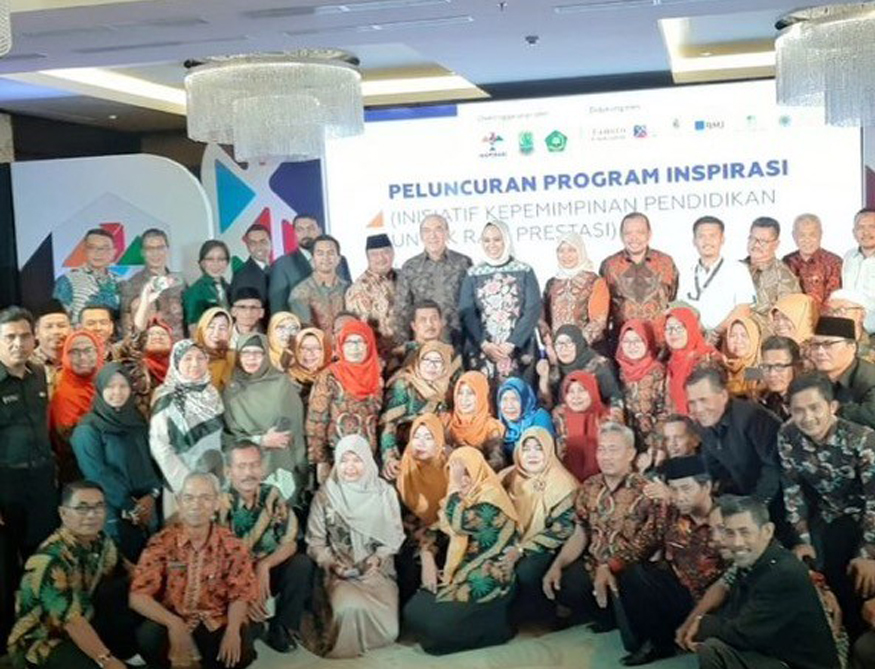
The official launch of INSPIRASI Foundation, attended by the Bupati (District Head) of Karawang, West Java Local Government, and all participating school principals
[ALUMNI-QUOTES TEXT="Patrya’s thinking is akin to a policymaker’s mindset—look for long term solutions to wicked problems. According to him, Indonesia’s school system faces three main challenges. The first is the need to improve the quality of education. “This the main homework now, not enrollment anymore as most children are already at school now,” he says. Next is empowering all stakeholders―teachers, principals, bureaucrats, private organisations and NGOs—with a sense of ownership so that they can fix problems. Finally, the solutions must be scalable. “By ‘scalable’, I mean the solution that can be replicated with ease. We can’t be satisfied if a solution works for a school or in one district only. We need to ask if it can work elsewhere too, and if it doesn’t, what adjustment should be made,” he adds.
In 2016, Patrya worked as a policy staff member for the then Minister of Education and Culture (MoEC) Anies Baswedan. He worked to set up the Center of Policy Analysis and Synchronization (PASKA), inspired by the “nudge unit” in the UK and the Presidential Unit for Development Monitoring and Oversight during Susilo Bambang Yudhoyono’s presidency. “I was part of a team that created the Local Government Education Report (Neraca Pendidikan Daerah), which made all local government education deliverables transparent to the wider public. The idea was to set the accountability right. People in Indonesia believed that MoEC managed the education system while the truth is that much of the authority for education is placed within the local government,” he explains.
Since Patrya was a non-civil servant member of the ministry, he held his position until 2017. “Little did I know at the time that my career in government will resume a little over a year later when I was tasked to set up a similar unit at the provincial government of Jakarta,” he says with a laugh."][/ALUMNI-QUOTES]
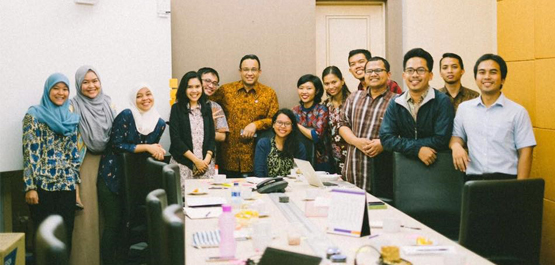
Working as policy staff member in the Ministry of Education and Culture (MoEC) in 2016, setting up the Center of Policy Analysis and Synchronization (PASKA) for the then-Minister of Education and Culture
Since 2019 he has been spearheading Inspirasi’s pilot project for training principals. Inspirasi combined in-the-room workshops with on-the-job training and coaching and designed the program to last for a year and a half. “Most trainings follow a day-long workshop and leave the principals to manage on their own when it comes to implementing the training. We are with them throughout. In our pilot, we trained 25 school and madrasahs principals. Every school was represented by the principal and one senior teacher. Sure, the number is small, but we want to make sure it worked and was effective before scaling it up,” Patrya adds. He had previously worked with J-PAL Southeast Asia, on a randomised control trial project that tried to fix the under-enrollment of the JKN programme (Indonesia’s national health insurance programme).
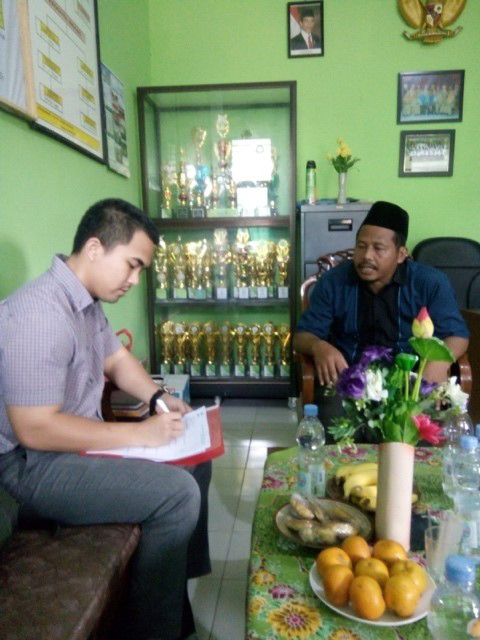
With INSPIRASI, we provided at school-coaching/facilitation for school principals.
Today Patrya says his biggest win as CEO of a non-profit has been to have all stakeholders including the donors, the principals and the government both at central and local levels to trust Inspirasi. “The trust is quite extraordinary as we are still a young organisation (all our staff are under 35 years old!) and we deal with school principals mostly over 40 years of age!” says Patrya.
Tagging LKYSPP as the “Harvard of Asia”, Patrya says being able to attend the School in Singapore opened a lot of regional networking opportunities for him. He believes the MPP programme pushes people to look at the practical side of policies instead of theories only. “Development sector is a practical sector because if you don’t improve the beneficiaries’ lives, fancy policies mean nothing. The MPP training in econometrics was quite useful in setting the framework of understanding how and if my programme is making an impact. Also, it taught me about policy advocacy and how messy the policy process is. This helps me a great deal now to stay on course and be relevant,” he adds.
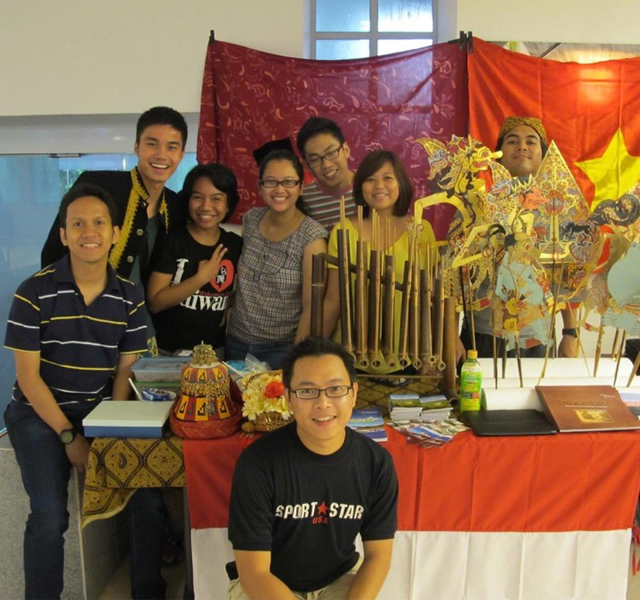
Cultural Night at LKYSPP with fellow Indonesian students.
Patrya says his year at LKYSPP also helped him to realise that one can’t separate politics, history, economics and sociology. “They all blend in and you have to take that into account while designing a development programme or a policy.” He adds that more than classes and courses, “the work ethic of LKYSPP or the kiasu (a Singaporean word for work ethic) was very important. It helped me introduce rigour in my nonprofit work much like you see in the private sector”.
For those taking up the MPP programme, Patrya’s advice: “Initially some classes may seem boring or irrelevant but don’t delete the materials you get from them. You might find them useful in later years. And of course, use your time in LKYSPP to network, network and network.”